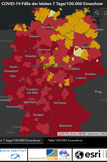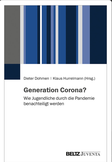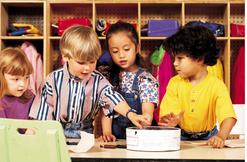Federal-Länder agreements: Updated version with the state regulations on day-care centres and schools - A colourful bouquet of regulations
Which regulations now apply and what they mean - an overview for parents and families
Suddenly everything happened very fast. Until last Thursday, one still had the impression that there would be major changes only shortly before Christmas. On Friday the mood changed and on Saturday first hints made the rounds that there will be a "hard lockdown" already on Wednesday this week. And the Chancellor and the Prime Ministers of the federal states will follow this line in their telephone conference on Sunday.

School closure and distance learning
The most important decision for parents and children regarding school closures is not clearly formulated. However, if one reads the key catchwords in context, I think the following emerges:
The schools will be closed from Wednesday, there will be no more attendance classes. However, the pupils do not have early and extended holidays. Instead, lessons will be switched to digital learning at home. However, some states, such as North Rhine-Westphalia and Brandenburg, will already apply this from Monday. Baden-Wuerttemberg wants to bring the Christmas holidays forward to 16 December, i.e. to next Wednesday. Since Hesse emphasizes that it wants to implement uniform rules for almost all pupils, this obviously means that other
For the parents, this means that in most cases they have to look after their children at home - as was the case with the lockdown in spring.
But there should also be exceptions.
According to information from the countries, the following regulations apply (without guarantee) (status: Sunday evening 20h):
Baden-Württemberg: Schools are going into early Christmas vacation Distance learning is available for graduating classes. For pupils up to 7th grade there may be emergency care.
Bavaria: According to the Süddeutsche Zeitung, the schools are to be closed on the one hand, but on the other hand, classes 1 to 7 are apparently to remain in attendance mode, while higher classes will switch to alternating teaching. With incidence values of at least 200 per 100,000 inhabitants and 7 days, students will switch to distance learning. There are emergency care options. In our opinion, the regulations are contradictory, we therefore ask for on-site inspection.
Berlin: there should be school-based learning. This should also apply at the beginning of January.
Brandenburg: The compulsory attendance at schools will be suspended from Monday, but schools will remain open for the time being In the first week of January, there will be distance learning for all pupils. All pupils are obliged to participate in distance learning. Then there will be emergency care only for the 1st to 4th classes.
Bremen: The compulsory attendance will be suspended as of Wednesday, the lessons will be distance learning. Pupils may however go to school.
Hamburg: The compulsory attendance will be abolished from 16 December 2020 to 10 January 2021 and replaced by other school offers. The schools will remain open until the Christmas holidays - but parents can decide whether their children should learn at school or at home
Hesse: From Wednesday onwards, there will be alternating lessons as well as emergency care if the parents cannot take over the care themselves.
Mecklenburg-Vorpommern: Unlike in some other federal states, kindergartens and schools are not closed in Mecklenburg-Vorpommern. However, compulsory attendance at schools for children up to the sixth grade will be abolished as of Wednesday, December 16, but parents can send their children to school until the regular start of the Christmas holidays. Pupils from the seventh grade onwards must stay at home from Monday onwards and should be taught at a distance. However, this does not apply to pupils from the Hanseatic city and the district of Rostock.
Lower Saxony: The compulsory attendance will be abolished from Monday 14.12. Parents will decide whether their children go to school or not.
North Rhine-Westphalia: Attendance is suspended as of Monday. There will be a regular offer for pupils in grades 1 to 7, but parents can decide for themselves whether they want to send their children or have them taught at a distance. Starting in grade 8, all students are to stay at home and switch to distance learning. The holidays are extended until 8 January.
Rhineland-Palatinate: In the schools the compulsory attendance ends on Wednesday, at the beginning of January there should be distance learning until 15.1. Emergency care is possible up to 7th grade.
Saarland: the compulsory attendance will be abolished, which according to the Saarbrücker Zeitung would mean closure for most pupils (Saarbruecker Zeitung). On Monday and Tuesday the pupils will receive learning materials for home use. There will be an emergency care service if care at home is not possible.
Pupils up to grade 6 can continue to come to school after informal notification from their parents if they cannot be looked after at home. In the afternoons, the volunteer all-day schools will offer childcare in the usual time frame
Pupils up to grade 6 can continue to come to school after informal notification from their parents if they cannot be looked after at home. In the afternoons, the volunteer all-day schools will offer childcare in the usual time frame.
Saxony: Schools are closed from Monday.
Saxony-Anhalt: From 16.12. onwards, compulsory attendance is abolished for school years 1-6 of all school types and, in addition, from the 7th school year onwards at special schools. It is recommended that the children be looked after at home, participation in attendance classes is not compulsory.
Schleswig-Holstein: From Monday (14 December), there will only be face-to-face lessons for pupils: in grades 1 to 7.
Thuringia: Schools are closed nationwide, but there is emergency care.
Emergency care
There is an emergency care facility. The details for whom emergency care is to be created are not yet defined in the decision. It is obvious that this will apply to parents who will continue to have to work "normally" in the workplace and who belong to the so-called care-related area. Details will have to be decided by the Länder.
It also remains unclear whether emergency care should also apply to children who do not receive the necessary learning support at home or where the well-being of the child may be at risk.
Graduation classes
Separate arrangements may be made for graduation classes. I guess that means that they can have face-to-face classes after all.
Kitas are also available
The same procedure is followed in day-care centres as in schools. They are therefore also closed on Wednesday. There will be emergency care, but it remains open in which cases emergency care will be provided. This will be decided by the Länder. Although it may seem obvious that, as in spring, emergency care will apply in particular to parents who still have to work "normally" at their place of work and belong to the so-called care-relevant area, emergency care will be provided in the future. However, this is not yet clear: there are voices that doubt this. According to the Länder, the following regulations apply (without guarantee) (status: Sunday evening 20h)
Baden-Württemberg: Kitas to close, emergency care
Bavaria: Kitas will be closed from Wednesday. But there is emergency care.
Berlin: only offers emergency care in day-care centres if there is no other possibility for care. However, parents should be given the opportunity to take childcare leave.
Brandenburg: Daycare centres will remain open, with the urgent recommendation to all parents to leave their children at home from Monday (14.12.) if possible
Bremen: The day-care centres are closed in principle, but there is the possibility to bring the child or children to the day-care centre (emergency care).
Hamburg: Kitas remain open.
Hesse: Kitas are closed from Wednesday. There is emergency care if the parents cannot take over the care themselves.
Mecklenburg-Vorpommern: Kitas will remain open in principle.
Lower Saxony: Parents will decide from Wednesday, 16.12. whether their children will go to the Kita or not.
North Rhine-Westphalia: Daycare centres will remain open; however, parents should take over the care themselves if possible.
Rhineland-Palatinate: daycare centres remain in regular operation; however, children should stay at home if possible.
Saarland: daycare centres are closing down, but there is emergency care for children who cannot be looked after at home.
Saxony: Kitas are closed from Monday.
Saxony-Anhalt: not specified
Schleswig-Holstein: The day-care centres will remain open, but children should stay at home if possible.
Thuringia: Kitas are closed nationwide, but there is emergency care.
Help for parents
Unlike in the spring, the agreements contain a few wordings to make it a little easier for parents to reconcile family and work. However, there is room for debate as to whether the proposed measures are sufficient.
On the one hand, employers are asked to check whether they allow home offices or arrange for company holidays. For all companies that have to close down anyway, these proposals are not a problem. In many other cases this will not be possible. This is all the more true as no compensation payments have been named and it is unclear whether this can be absorbed by bridging payments. We have described here what you can do to deal proactively with this situation and what your employer thinks is good.
Furthermore, additional possibilities are to be created for parents to be given paid leave to care for their children during the period mentioned. The proposal with paid leave is certainly helpful for parents. Unfortunately, however, it remains unclear how the employer is to be compensated for this and how the associated costs are to be absorbed.
2 households up to a maximum of 5 persons may meet - not counting children under 14 years of age
A maximum of five people from two households may meet. Children under 14 years of age are not counted in the number of persons. This again allows for some leeway. This means that two adults and one young person can meet, plus any number of younger children.
Can the children meet their friends?
In principle, children and young people are allowed to meet at least one friend. They are allowed to meet several friends if they come from the same two households.
However, it is unclear whether children under 14 years of age can also meet with more than one child, for example if they come from three or four households. If the guidelines are interpreted generously, this could be possible. In this case, even the child's birthday could be celebrated again, provided that there are no more than five older people from no more than two households.
However, it should also be mentioned that it was pointed out that any contact that is not necessary should be avoided if possible.
Special arrangements for Christmas
Special rules apply for Christmas: between 24.12.2020 and 26.12.2020 a household may meet with up to 4 other persons from the immediate family circle or very close relatives. Children under the age of 14 are not counted here either.
The closest family circle includes spouses, life partners; relatives must be the straight line, i.e. children or grandparents as well as siblings, including their children.
However, it is also pointed out that this regulation applies depending on the occurrence of infection. This means that the Länder can issue different regulations depending on the level of infection.
New Year's Eve
On New Year's Eve the normal rules apply. This means that a maximum of 5 people from two households may meet. Children under the age of 14 are not counted. Furthermore, there is no sale of fireworks etc. and a general ban on fireworks can be issued.
What will happen from January 10, 2021 onwards?
The regulations adopted will initially apply until 10th January 2021, after which the Chancellor and the Prime Ministers of the Länder will decide on 5th January how to proceed. If one follows the statements of individual participants, there will still be restrictions after 10 January. Which ones will depend on the occurrence of infection at the beginning of January. We will report on the latest regulations on 5 January 2021.
Country sovereignty
It is also important that the federal states are responsible for the concrete implementation and can adapt the regulations within the framework of the agreements. Our website Corona-was-darf-ich provides information about the further regulations in the federal states. (Corona-what-may-I).
Published on
Topics
Articles on the topic
-
How do I find a school place for my child?
Depending on the state and type of school, different things need to be...

-
Childcare - how does it work in Germany?
The path from application to daycare place is simple and complicated at...

-
Controversy: open schools or close schools?
Politicians should react now to slide unprepared into a forced closure....

-
Corona pandemic severely disadvantages children and young people - but there is no "Corona generation"
This is a core finding of the anthology "Generation Corona? How young...

-
What to do after the Easter holidays? - Part 2: Final exams
An overview of the regulatory diversity

-
Kitas and schools in a state of flux
Update from 9.4.2021 on the current regulations
